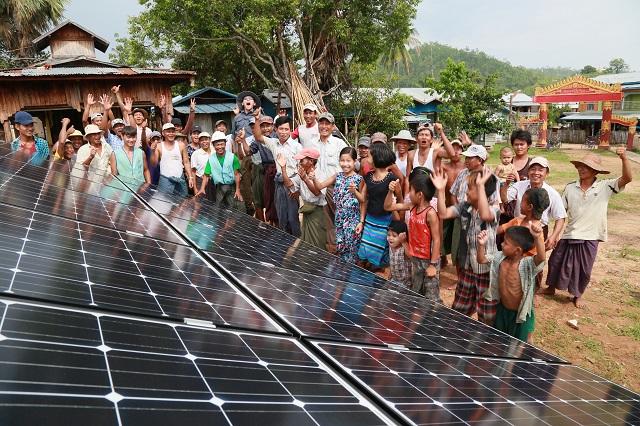
TaiwanICDF project lights up rural Myanmar
On December 6, 2017, International Cooperation and Development Fund (TaiwanICDF) Deputy Secretary General Lee Pai-po, along with representatives from the Taipei Economic and Cultural Office in Myanmar, Industrial Technology Research Institute (ITRI) and PINO Technologies Corporation Limited, attended the handover ceremony of the pilot Technical Assistance for Solar Photovoltaic (PV) Mini-Grid System for Lighting in Myanmar Rural Areas. The project is jointly funded by the TaiwanICDF and the Ministry of Foreign Affairs of the Republic of China (Taiwan).
The ceremony was held in BawDiGone Village, Sagaing Region (Province), one of the remote villages that has benefited from the project, and saw the participation of more than 500 people including officials of the Department of Rural Development (DRD) at national, provincial and township levels, provincial assembly members, journalists, teachers and students, as well as villagers.
In rural Myanmar, two thirds of households still lack access to electricity and rely on candles, kerosene, and batteries to supply lighting at nighttime. “We have a dream and hope that all rural areas in Myanmar will have access to electricity for lighting,” said an assembly member of Sagaing Province during his address to the audience. “Today, the dream can be partially realized in BawDiGone Village.”
The technical assistance project was designed by the TaiwanICDF, in line with the Myanmar Government’s policy to increase rural electrification and lighting. After detailed discussions between the TaiwanICDF and the government, a number of target villages were selected from more than 40,000 candidates. Through the collaborative efforts of ITRI’s consulting services and PINO’s expertise in design and supply of quality equipment, three solar PV mini-grid power stations and associated lighting appliances were installed, including two systems in BawDiGone and nearby villages and one in Inbingan Village, Magway Region (Province), to light up a total of nearly 600 households.
The project was implemented with the villagers’ participation. To ensure the villagers’ capacity and commitment to manage the solar PV systems, ITRI, which has extensive experience in implementing solar PV projects, collaborated with the DRD to establish a Power Supply System Management Committee within the villages, design a user-pay mechanism and conduct relevant training and capacity development activities on systems operation and maintenance for the committees and villagers.
Since the commissioning in June 2017, the power supply systems have steadily provided electricity for lighting within the households, allowing students to better study at night and villagers more time for their family and business activities, and saving their expenses on candles and kerosene. The results achieved are in line with the dual sustainable development goals of inclusive economic growth and access to affordable and clean energy.
- Update: 2017/12/26
- Hits:68

